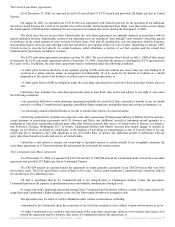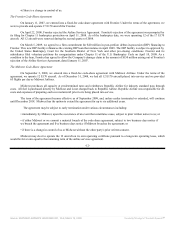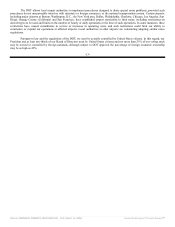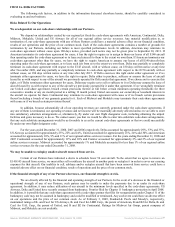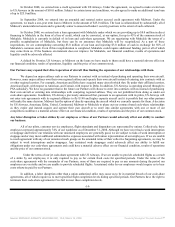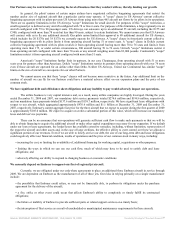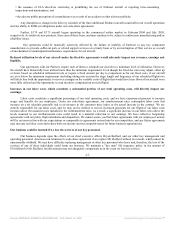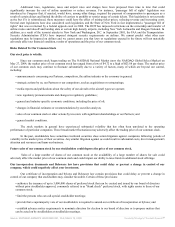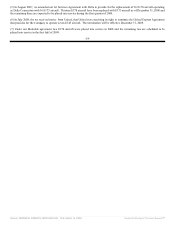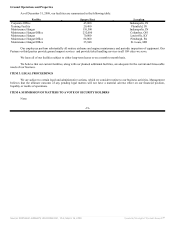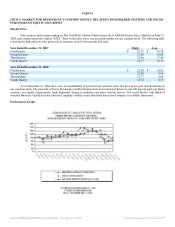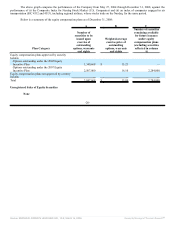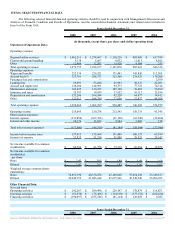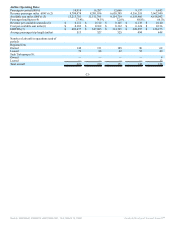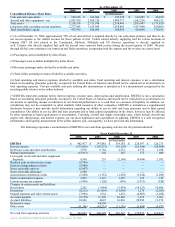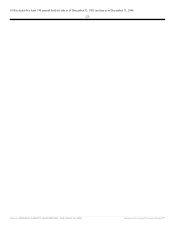Frontier Airlines 2008 Annual Report Download - page 32
Download and view the complete annual report
Please find page 32 of the 2008 Frontier Airlines annual report below. You can navigate through the pages in the report by either clicking on the pages listed below, or by using the keyword search tool below to find specific information within the annual report.
Additional laws, regulations, taxes and airport rates and charges have been proposed from time to time that could
significantly increase the cost of airline operations or reduce revenues. For instance, "passenger bill of rights" legislation was
introduced in Congress that, if enacted, would have, among other things, required the payment of compensation to passengers as a
result of certain delays and limited the ability of carriers to prohibit or restrict usage of certain tickets. This legislation is not currently
active but if it is reintroduced, these measures could have the effect of raising ticket prices, reducing revenue and increasing costs.
Several state legislatures have also considered such legislation, and the State of New York in fact implemented a "passenger bill of
rights" that was overturned by a federal appeals court in 2008. The DOT has imposed restrictions on the ownership and transfer of
airline routes and takeoff and landing slots at certain high density airports, including New York LaGuardia and Reagan National. In
addition, as a result of the terrorist attacks in New York and Washington, D.C. in September 2001, the FAA and the Transportation
Security Administration (TSA) have imposed stringent security requirements on airlines. We cannot predict what other new
regulations may be imposed on airlines and we cannot assure you that laws or regulations enacted in the future will not materially
adversely affect our financial condition, results of operations and the price of our common stock.
Risks Related To Our Common Stock
Our stock price is volatile.
Since our common stock began trading on The NASDAQ National Market (now the NASDAQ Global Select Market) on
May 27, 2004, the market price of our common stock has ranged from a low of $4.72 to a high of $23.88 per share. The market price
of our common stock may continue to fluctuate substantially due to a variety of factors, many of which are beyond our control,
including:
• announcements concerning our Partners, competitors, the airline industry or the economy in general;
• strategic actions by us, our Partners or our competitors, such as acquisitions or restructurings;
• media reports and publications about the safety of our aircraft or the aircraft types we operate;
• new regulatory pronouncements and changes in regulatory guidelines;
• general and industry specific economic conditions, including the price of oil;
• changes in financial estimates or recommendations by securities analysts;
• sales of our common stock or other actions by investors with significant shareholdings or our Partners; and
• general market conditions.
The stock markets in general have experienced substantial volatility that has often been unrelated to the operating
performance of particular companies. These broad market fluctuations may adversely affect the trading price of our common stock.
In the past, stockholders have sometimes instituted securities class action litigation against companies following periods of
volatility in the market price of their securities. Any similar litigation against us could result in substantial costs, divert management's
attention and resources and harm our business.
Future sales of our common stock by our stockholders could depress the price of our common stock.
Sales of a large number of shares of our common stock or the availability of a large number of shares for sale could
adversely affect the market price of our common stock and could impair our ability to raise funds in additional stock offerings.
Our incorporation documents and Delaware law have provisions that could delay or prevent a change in control of our
company, which could negatively affect your investment.
Our certificate of incorporation and bylaws and Delaware law contain provisions that could delay or prevent a change in
control of our company that stockholders may consider favorable. Certain of these provisions:
• authorize the issuance of up to 5,000,000 shares of preferred stock that can be created and issued by our board of directors
without prior stockholder approval, commonly referred to as "blank check" preferred stock, with rights senior to those of our
common stock;
• limit the persons who can call special stockholder meetings;
• provide that a supermajority vote of our stockholders is required to amend our certificate of incorporation or bylaws; and
• establish advance notice requirements to nominate directors for election to our board of directors or to propose matters that
can be acted on by stockholders at stockholder meetings.
Source: REPUBLIC AIRWAYS HOLDINGS INC, 10-K, March 16, 2009 Powered by Morningstar® Document Research℠


